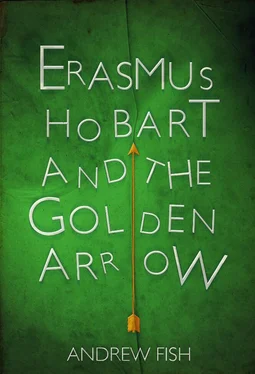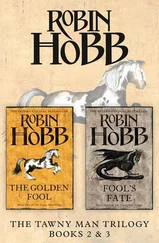Erasmus thought briefly of the culture of twenty-first-century England where some women would probably dance naked if it got them on Big Brother. He thought about trying to explain that they simply didn’t offer themselves to poor teachers with no prospect of fame and fortune, but decided against it. ‘Not really,’ he said.
‘Fair enough,’ said the woman. ‘What are you in for? My name’s Maude, by the way.’
‘Erasmus,’ said Erasmus.
‘Is that a name or a crime?’
‘It’s my name. I’m in for…’ Erasmus paused; he wasn’t exactly sure why he was in a dungeon. ‘I think I embarrassed a knight,’ he continued.
‘Embarrassment, eh! Telling bawdy jokes, were you?’
‘No. I think it’s because I made him fall off of his horse – must be a couple of years ago.’
‘And you’ve been locked up for that? God, they’ll put you away for anything now. Who was it?’
‘I don’t know his name. Tallish chap, though, well built.’
‘They all look like that – built like towers with brains to match.’
‘He had blonde hair and a scar on his cheek – that was the second time I saw him, anyway.’
‘What? ’Is hair changed colour?’
Erasmus shook his head. ‘No,’ he said. ‘The scar was new. Looked like he’d been slashed across the cheek.’
Maude looked at him thoughtfully. ‘That’s Gisburne, that is,’ she said. ‘You get on the wrong side of ’im he won’t forget it. They call ’im Guy the Gamekeeper.’
‘Gamekeeper?’
‘He kills poachers for sport. Well, I’m going to let you in on a secret, m’duck, any enemy of Gisburne is a friend o’ mine and I think friends ought to ’elp each other, don’t you?’
Erasmus nodded. ‘Quite,’ he said.
‘Well, I’m going to be busted out of ’ere in a few ’ours – I might be able to get you out as well.’
Erasmus’ eyebrows raised in curiosity. The name Gisburne had rung a bell.
‘Who’s coming?’ he said. ‘Is it Robin Hood?’
‘Robin ’ood?’ Maude chuckled, a sound not dissimilar to the clucking of a broody hen.
‘He does exist, doesn’t he?’ said Erasmus – it would be a dreadful disappointment to find that Robin was a legend even now.
‘Oh, ’e exists,’ said Maude. ‘I just don’t think ’e’s the kind of person you want to rescue you.’ She ignored Erasmus’ attempts to interrupt with questions and continued. ‘Now, when the girls get ’ere, try not to say too much – ’specially to Alice – and I might be able to bring you along.’
‘Alice?’
‘One of the girls, but she’s a little enthusiastic with ’er dagger when there’s men around. You keep quiet and she’ll probably let you get away with your balls.’
‘Ah,’ said Erasmus, nodding. ‘So what’s Robin Hood like?’
‘What is this obsession with Robin ’ood?’
‘He’s a legend where I come from.’
‘Well he isn’t a legend ’ere and, if you don’t want a nice ’igh singing voice, I wouldn’t mention’is name when Alice is around.’
‘Why?’
‘Ask a lot of questions, don’t you? I don’t know what it’s like in foreign, but over ’ere that can shorten your life.’
‘Shorten it?’
‘By about a ’ead’s’eight. Now, d’you say it was afternoon when you got ’ere?’
‘Yes.’
‘Well, we got a couple of’ours then. You sure you don’t want to…’
‘Thanks, but not right now.’
‘Suit yourself. Guess I’ll get a bit of kip then.’
Erasmus leant back against the wall and breathed deeply. He was definitely in the right time, but things weren’t turning out quite the way he’d planned. As he closed his eyes, the old man picked up his little collection of straw, wiped up some rat-droppings with it, then walked over to the middle of the room and dumped it on the pile.
Chapter Seven Contents Title Page ERASMUS HOBART and the GOLDEN ARROW Dedication Chapter One Chapter Two Chapter Three Chapter Four Chapter Five Chapter Six Chapter Seven Chapter Eight Chapter Nine Chapter Ten Chapter Eleven Chapter Twelve Chapter Thirteen Chapter Fourteen Chapter Fifteen Chapter Sixteen Chapter Seventeen Chapter Eighteen Chapter Nineteen Chapter Twenty Chapter Twenty-one Chapter Twenty-two Chapter Twenty-three Epilogue About the Author Credits Copyright About Authonomy About the Publisher Конец ознакомительного фрагмента. Текст предоставлен ООО «ЛитРес». Прочитайте эту книгу целиком, купив полную легальную версию на ЛитРес. Безопасно оплатить книгу можно банковской картой Visa, MasterCard, Maestro, со счета мобильного телефона, с платежного терминала, в салоне МТС или Связной, через PayPal, WebMoney, Яндекс.Деньги, QIWI Кошелек, бонусными картами или другим удобным Вам способом.
Erasmus lay back against the wall of the dungeon, deep in thought. As a tourist in his own time, he’d visited the shells of many castles and seen their ruined dungeons, but nothing had really prepared him for the psychological impact of being imprisoned in one.
He’d heard the stories, of course: he knew well the tale of how prisoners in Carlisle Castle had been compelled to lick the walls to quench their thirst; he’d seen the waxworks that filled the dungeons of Warwick, hanging around in manacles or tied on racks. The trouble was that such images were so different to anything in his experience that it was hard to relate to them. You could understand the pain of torture as prisoners were interrogated; you could even try to comprehend the deprivations of an inadequate diet whilst they awaited their fate – something familiar to many poor university students – but what was difficult to handle was the simple torture of imprisonment itself. The greatest terror a dungeon could bring was not the application of thumbscrews to extract a confession, or even the cheerful banter of the hangman as he came to measure you up for your scaffold, it was the horrifying tricks the mind of an incarcerated man could play when there was nothing to do but think. And for someone who did a lot of thinking it could take a lot less time for the effects to kick in.
Oubliette. The word ran through Erasmus Hobart’s brain looking for a reason. Place of forgetting – oubliette. Forgetting what? Surely you only forget things when you’re preoccupied. If all I’ve got to do is think, I ought to have an eidetic memory by now. The time. What’s the time? See, you’ve forgotten that. No, I remember what the time was when I saw it last, I just don’t know how long ago it was. That’s not the same as forgetting. Is it day or night? How can you tell? It never changes in here. It can’t have been more than four or five hours, but what time did I arrive? Oubliette.
The distant sound of a grunt roused Erasmus from his thoughts and he looked around the room. Most of the prisoners were asleep, so perhaps mediaeval people had some internal body clock that told them whether it was day or night in the outside world. The old man wasn’t asleep, though, he seemed to be continuing his earlier argument with the wall, but even he was keeping his voice down.
Oubliette. Why did they call it that? Did they forget they’d shoved you in it perhaps? No, it couldn’t be that – they’d be popping round to have a look every five minutes, just to see what was there. Perhaps forgetting was a crime? Perhaps you could get locked up for forgetting. That wouldn’t go down very well back at school – every time someone handed their homework in late, they’d be struggling for an excuse other than ‘I forgot’. ‘The dog ate it’, ‘it got flushed down the toilet’, ‘Mulder and Scully came round and confiscated it because the FBI didn’t want it published’ – he’d heard some excuses since he’d started, but ‘I forgot’ was still the original and classic. Oubliette. Why oubliette?
Читать дальше











